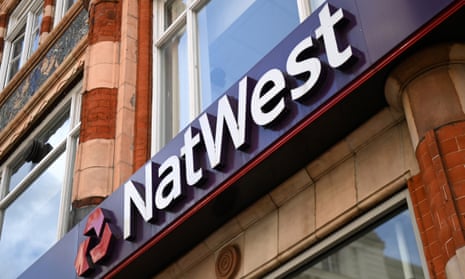The Treasury is in line for bumper payouts after NatWest Group, which is majority owned by the taxpayer, returned to profit and announced plans to return £3bn to stockholders through dividends and share buybacks over the next three years.
Natwest said it planned to pay investors dividends worth £347m at 3p a share after swinging to a £2.5bn profit in the first half of the year as the British economy recovers from Covid-19.
The UK government still holds a 54.7% stake inNatwest more than a decade after its state bailout during the 2008 financial crisis, meaning at least £190m will go to the exchequer.
Taxpayers could be in line for an even larger payout, however, as NatWest revealed plans for a £750m general share buyback this year, and plans to distribute at least £1bn a year to shareholders for the next three years.
It came as the bank returned to profit in the second quarter, having swung to a loss of £1.3bn last year after it put aside cash to cover potential customer defaults during the Covid crisis. Pre-tax profits for the three months to the end of June jumped to £1.6bn, easily beating consensus estimates of £861m.
Profits benefited from improving economic forecasts as lockdown measures were relaxed, which allowed the bank to reduce the pile of cash it had put aside to cushion the blow of potential loan defaults by about £605m. Analysts had expected NatWest, which put aside £2.1bn to cover bad debts during the same period in 2020 at the height of the Covid recession, to release only £84m.
“These results have been driven by good operating performances across the group, underpinned by a robust loan book and a strong capital position,” the chief executive, Alison Rose, said, adding that the economic outlook had driven the release of cash. “While we see the potential for a more rapid recovery, we will continue to take an appropriate and conservative approach as the government schemes wind down and the economy reopens.”
NatWest significantly increased its forecasts, saying it expected the British economy to grow at its fastest rate since the second world war. The bank forecasts UK GDP growth of 7.3% for the whole of 2021, up from previous estimates of a 4.8% rise. Meanwhile, the unemployment rate is expected to hit 5.3% for the year, down from the 11.7% predicted by the bank back in December.
“Credit quality continues to remain good, defaults remain low. We’re seeing consumer spending, particularly in debit card and credit card spending, coming back to pre-Covid 19 levels particularly as we come out of lockdown,” Rose said.
Despite the improving outlook, NatWest cut its banker bonus pool by 20% for the first half of the year to £142m, down from £179m a year earlier. Its rivals Lloyds and Barclays announced this week they were increasing bonuses in light of their stronger performance.
“We’ll look at our bonus at the year-end based on our performance,” Rose said. “I think what you can see for the half-year results is we’re making good progress on the targets that we have set.”
The government announced plans earlier this month to gradually sell its NatWest shares over the next 12 months, in a move that will cut taxpayer ownership to a minority stake more than a decade after it was bailed out during the financial crisis. The Treasury is aiming to sell off its remaining £12.6bn stake in NatWest by 2025-26.
NatWest’s chairman, Howard Davies, said the bank would probably seek shareholder approval to launch another targeted buyback – whereby the bank purchases shares held by its investors – aimed solely at reducing the government’s holding by another 4.9%.
“We will renew approval for that at the next AGM, so we would be able to do that in the next 12 months,” he added.
